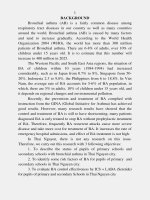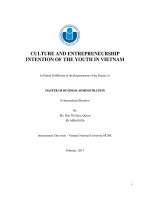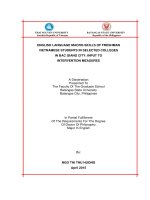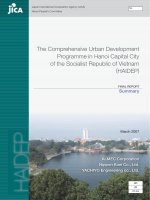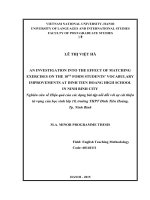Experinces of graduate unemployed youth in tabor sub city of hawassa city
Bạn đang xem bản rút gọn của tài liệu. Xem và tải ngay bản đầy đủ của tài liệu tại đây (1.65 MB, 104 trang )
RUNNING HEAD: EXPERINCES OF GRADUATE UNEMPLOYED YOUTH
EXPERINCES OF GRADUATE UNEMPLOYED YOUTH IN
TABOR SUB CITY OF HAWASSA CITY
BY: TEMESGEN LENCHA
College of Social Science
School of Social Work
Addis Ababa University
June 2017
RUNNING HEAD: EXPERINCES OF GRADUATE UNEMPLOYED YOUTH
EXPERINCES OF GRADUATE UNEMPLOYED YOUTH IN TABOR SUB
CITY OF HAWASSA CITY
A THESIS SUBMITTED TO ADDIS ABABA UNIVERSITY IN PARTIAL
FULFILLMENT OF THE REQUIREMENTS FOR THE DEGREE OF MASTERS OF
SOCIAL WORK
BY
TEMESGEN LENCHA
ADVISOR
ABEBE ASSEFA/PHD/
JUNE 2017
ADDIS ABABA, ETHIOPIA
RUNNING HEAD: EXPERINCES OF GRADUATE UNEMPLOYED YOUTH
Declaration
This is to certify that the thesis prepared by Temesgen Lencha entitled: ―The Experiences of
Graduate Unemployed Youth in Tabor Sub City of Hawassa City‖ submitted in partial
fulfillment of the requirements for the degree of Master of Arts Social Work complies with the
regulation of the university and meets the accepted standards with respect to originality and
quality.
APPROVED BY EXAMINING BOARD
___________________________________
NAME, EXTERNAL EXAMINER
___________________________________
NAME, INTERNAL EXAMINER
___________________________________
NAME, ADVISOR
_______________________
_____________
SIGNATURE
_______________________
DATE
_____________
SIGNATURE
_______________________
DATE
_____________
SIGNATURE
DATE
____________________________________________________
CHAIR OF DEPARTEMENT OR GRADUATE PROGRAM COORDINATOR
EXPERIENCES OF GRADUATE UNEMPLOYED YOUTH………
Acknowledgement
Above all, I would like to thank the Almighty God who supported me to accomplish this
research. More than anyone else perhaps, I am truly indebted to my advisor, Abebe Assefa
(PHD). This research would not have been completed without his helpful insights and
suggestions. By the same token, I want to give special thanks to Ashenafi Hagos(PHD) for
providing support when I am in need, in few points of course.
Besides my special thanks go to the youth, the parent and government officials in Sub City, in
City Administration and BoFED for their openhearted cooperation. Abaye and Emaye how could
I forget you? Your prayers were my motivation to uplift when I staggered and hope to believe in
the final paper.
Finally, my best friends Altish, Bisry, Obbo Yewelegaw, Firfir and Maazi, you all have special
rooms in my heart. In addition to this, I also thank all TEREKO group for your unreserved
information exchange and concern.
I
EXPERIENCES OF GRADUATE UNEMPLOYED YOUTH………
Table of content
Contents
Pages
Acknowledgement ...................................................................................................................... i
Table of content ......................................................................................................................... ii
List of table ............................................................................................................................... vi
List of figure ............................................................................................................................. vi
List of Abbreviation and acronym ............................................................................................ vii
Abstract .................................................................................................................................... ix
Chapter One ................................................................................................................................1
1. Introduction.............................................................................................................................1
1.1 Background of the study ....................................................................................................1
1.2 Statement of the problem ...................................................................................................3
1.3 Objectives ..........................................................................................................................6
1.31 General objective .........................................................................................................6
1.3.2 Specific objectives .......................................................................................................6
1.4 Research questions.............................................................................................................7
1.5 Significance of the study ....................................................................................................7
1.6 Scope of the study..............................................................................................................7
1.7 Limitation of the study .......................................................................................................8
1.8 Operational definition of terms and concepts .....................................................................8
Chapter two............................................................................................................................... 10
2. Literature review ................................................................................................................... 10
2.1 Defining youth ................................................................................................................. 10
2.2 Youth unemployment as a global problem ....................................................................... 11
II
EXPERIENCES OF GRADUATE UNEMPLOYED YOUTH………
2.3 Youth unemployment in Ethiopia..................................................................................... 12
2.4 Graduate youth unemployment in Ethiopia ...................................................................... 13
2.5 Types of youth unemployment ......................................................................................... 14
2.6 Major ccauses of graduate youth unemployment .............................................................. 15
2.6.1 Low quality graduates ............................................................................................... 15
2.6.2 Poor performance of Micro and Small Enterprises(MSEs) ......................................... 15
2.6.3 Skills mismatch. ........................................................................................................ 16
2.6.4 Corruption, nepotism and political affiliation ............................................................. 16
2.7 Impacts of graduate youth unemployment ........................................................................ 17
2.7.1 Impact graduate youth unemployment on the youth themselves ................................. 17
2.7.2 Impact of graduate youth unemployment in families of the youth .............................. 18
2.7.3 Impact of graduate youth unemployment on socioeconomic of the country ................ 19
2.8 Job search experiences of graduate unemployed youth ..................................................... 19
2.9 Human capital theory ..................................................................................................... 20
2.10 Ways of curbing graduate youth unemployment ............................................................. 22
2.11 Government policies and strategies related to youth unemployment in Ethiopia ............. 22
Chapter Three ........................................................................................................................... 24
3. Research Methodology .......................................................................................................... 24
3.1 Research design ............................................................................................................... 24
3.2 Study area ........................................................................................................................ 25
3.3 Sampling ......................................................................................................................... 26
3.4 Methods of data collection ............................................................................................... 28
3.4.1 Primary data collection tools ..................................................................................... 28
3.4.1.1 Interview ................................................................................................................ 28
3.4.1.2 Focus Group Discussion (FGD) .............................................................................. 29
III
EXPERIENCES OF GRADUATE UNEMPLOYED YOUTH………
3.4.1.3 Observation ............................................................................................................ 30
3.4.2 Secondary data collection tools.................................................................................. 30
3.5 Data analysis plan ............................................................................................................ 30
3.6 Quality assurance ............................................................................................................. 31
3.7 Ethical consideration ........................................................................................................ 32
Chapter Four ............................................................................................................................. 34
4. Data Presentation .................................................................................................................. 34
4.1. Explaining unemployment from the youth’s lived experiences ........................................ 36
4.1.1 Previous expectation of securing a job after graduation ............................................. 36
4.1.2 Current experiences of unemployed youth ................................................................. 37
4.1.3 Experiences of passing a day ..................................................................................... 38
4.1.4 Defining a job from the youth lived experiences ........................................................ 39
4.2 Efforts the graduate unemployed youth exerted to be employed ....................................... 40
4.2.1 Job searching experiences of graduate unemployed youth.......................................... 40
4.2.2 Experiences of the youth engaging in Micro and Small Enterprises ........................... 41
4.2.3 Experience of youth to engage in underemployment .................................................. 42
4.3 Major causes of graduate youth unemployment ................................................................ 43
4.3.1 Skills mismatch ......................................................................................................... 43
4.3.2 Corruption, nepotism and political affiliation ............................................................. 45
4.3.3 Low quality graduates ............................................................................................... 46
4.4 Challenges of graduate youth unemployment in individual, familial and social levels ...... 46
4.4.1 Challenges of graduate unemployed youth on themselves .......................................... 46
4.4.1.1 Psychological effects on the youth .......................................................................... 46
4.4.1.2 Increased exposure in health problems .................................................................... 48
4.4.1.3 Graduate unemployment status increased exposure to engage in addiction .............. 48
IV
EXPERIENCES OF GRADUATE UNEMPLOYED YOUTH………
4.4.1.4 Lead the youth to late adulthood responsibilities ..................................................... 49
4.4.1.5 Graduate unemployment status increased exposure to illegal migration .................. 50
4.4.1.6 Graduate unemployment status increased exposure to engage in crime ................... 50
4.4.1.7 Negative attitudes towards education ...................................................................... 51
4.4.2 Challenges of graduate youth unemployment on the youth’s family........................... 52
4.4.2.1 Economic and psychological burden on the family ................................................. 52
4.4.2.2 Creates psychological distress on the family ........................................................... 52
4.4.3 Socioeconomic challenges of graduate youth unemployment ..................................... 53
4.5 Efforts of government to tackle graduate youth unemployment ........................................ 53
Chapter Five ............................................................................................................................. 55
5. Discussion ............................................................................................................................. 55
Chapter Six ............................................................................................................................... 64
6. Conclusion and implication ................................................................................................... 64
6.1 Conclusion ....................................................................................................................... 64
6.2 Implication of the study ................................................................................................... 66
6.2.1 Implication to social work practice and intervention .................................................. 66
6.2.2 Implication for social policy and programs ................................................................ 67
6.2.3 Implication for social work education......................................................................... 69
6.2.4 Implication for other researcher .................................................................................. 69
Reference .................................................................................................................................. 70
Appendices .............................................................................................................................. 79
V
EXPERIENCES OF GRADUATE UNEMPLOYED YOUTH………
List of table
Page
Table 1: Personal information of research participants ............................................................... 35
List of figure
Pages
Fig 1: Hawassa City administrative map .................................................................................... 26
Fig 2: Enrollment and graduate in undergraduate program from governmental and
nongovernmental higher institutions ........................................................................... 44
VI
EXPERIENCES OF GRADUATE UNEMPLOYED YOUTH………
List of Abbreviation and acronym
AU:
African Union
AYC:
African Youth Charter
BoFED:
Bureau of Finance and Economic Development
COC:
Certificate of Competency
CSA:
Central Statistics Agency
EEA:
Ethiopian Economic Association
EPRDF:
Ethiopian Federal Democratic Republic of Ethiopia
ETB:
Ethiopian Birr
FDRE:
Federal Democratic Republic of Ethiopia
FGD:
Focus Group Discussion
GPA:
Grade Point of Average
GTPII:
Growth and Transformation Plan II
GUY:
Graduate Unemployed Youth
ILO:
International Labor Organization
MoE:
Ministry of Education
MoFED:
Ministry of Finance and Economic Development
MoLSA:
Ministry of Labor and Social Security
VII
EXPERIENCES OF GRADUATE UNEMPLOYED YOUTH………
MSEs:
Micro and Small Enterprises
MYSC:
Ministry of Youth Sport and Culture
NASW:
National Association of Social Works
NEPS:
National Employment Policy Strategy
SEPDM:
South Ethiopia People Democratic Movement
SNNPRS:
South Nations Nationalities Peoples Regional State
TVET:
Technical Vocational Education Training
UN:
United Nations
VIII
EXPERIENCES OF GRADUATE UNEMPLOYED YOUTH………
Abstract
This research was conducted in Hawassa city to assess experience of graduate unemployed
youth. As qualitative study, I employed descriptive phenomenological research. Interview, focus
group discussion, observation and document review were employed. Heterogeneous purposive
non-random sampling technique was used to collect data from the youth. Among the research
participants, ten youth engaged in in-depth interview while six youth had part in focus group
discussion. The inclusion criteria are the youth who graduated in diploma and bachelor degree
and not secured any job since their graduation at least for one year. The finding of the study
indicated graduate unemployed youth faced long-term unemployment; as a result, the youth were
suffering from psychological, social and economic hardship. The finding also indicated that
unemployed youth are more likely exposed to engage in social ills such as crime and addiction.
The youth also suffer from family and social stereotype deprived from certain privileges. In the
study, it is revealed that the youth withdrew themselves from various societal engagements.
Moreover, the family of the youth also stressed economically and psychologically due to the fact
that they did not get something in return from their investment in their children‟s education.
Corruption and nepotism, skill mismatch, need to work only in comfortable areas are the major
causes of unemployment in the study area.
Key words: unemployment, youth, graduate, job
IX
EXPERIENCES OF GRADUATE UNEMPLOYED YOUTH………
Chapter One
1. Introduction
1.1 Background of the study
According to National Association of Social Workers Standards for the Practice of Social
Work with Adolescents (2003, p.5), equitable access to employment opportunities is one of
essentials for ensuring positive outcomes for youth. Most young people are able to navigate these
adolescent years successfully. Far too many youths, however, experience significant challenges
during this time that obstruct their ability to move successfully into adulthood.
One of the decisive challenges youth face is unemployment. Youth unemployment is a
notion of global problems, threatening whole humanity including educated and illiterate mass
especially youth to cope up the magnitude of the problem in their respective locality. It is a
serious concern of every nation. Young workers everywhere invariably have much higher rates
of joblessness and much lower earnings than older workers do. The challenge of youth
employment in Africa is especially large (Guarcello & Rosati, 2007, p.1).
Developing countries are more victimized than others are and Ethiopia has its own
difficulty in unemployment (Nayak, 2014, p.34). As underdeveloped country, Ethiopia is facing
unemployment decisively. This is particularly the case for Ethiopia, home to one of the largest
youth populations in Sub-Saharan Africa. The lack of employment opportunities for Ethiopian
young people is among the critical development challenges facing the country (Guarcello &
Rosati, 2007 p.2). In Ethiopia, currently there are more accessibility created to attend in
education, many people are investing in education hoping the retunes. According to the report of
Ministry of Education (2015, p.140,160), in Ethiopia recently the data indicates every year
hundreds of thousands graduates from colleges and universities across the country come into the
1
EXPERIENCES OF GRADUATE UNEMPLOYED YOUTH………
labor market. The youth hoped that they securing white-collar jobs after their graduation.
However, the probability of getting a job has become very challenging. This amount of people
joins the labor force despite the fact that hundreds of thousands graduates are looking for jobs to
secure. Youth with higher education were less likely to be unemployed two decades ago than
they were in recent years (Broussard & Tekleselassie, 2012).
The rise in the quantity of young people in tertiary educational institutions is a positive
development but labor markets in most countries are currently incapable of engrossing the
increasing number of young school leavers (Awogbenle & Iwuamadi, 2010). Similarly, in
Ethiopia also increasing education access resulted in the problem of educated youth
unemployment (Broussard & Tekleselassie, 2012). O’ Haggins (2001, p.33) states in developing
countries the claiming that youth unemployment is concentrated among the better educated ones
is found unlikely. On the contrary, the study conducted by (Broussard & Tekleselassie, 2012,
p.21) depicts that there is a positive relationship between the increment in educational attainment
and unemployment. This positive relationship experienced in a number of developing countries
has been termed the educated unemployment problem, where there exists a mismatch between
the education and training skills available and the requirements of the labor market.
Graduate unemployment challenges should be addressed profoundly. Unless and
otherwise, according to (Guarcello & Rosati, 2007, p.1) failure to address youth employment
issues will have serious consequences for the economy and society. Levinsohn, Rankin, Roberts
& Schoe, (2014) elaborate failing to address the graduate youth’s key objective of initial work
experiences may lead to undesirable outcomes that may be irreversible in many cases. Youth
unemployment, moreover, has a serious effect not only on the living standards of the people
2
EXPERIENCES OF GRADUATE UNEMPLOYED YOUTH………
(negative effects on the psychology, socio-economic and physical well-being) but also on the
socio-economic status of a nation (Fitsum Dechasa, 2014, p.201).
The impact on individual unemployed youth and on socioeconomic is multifaceted.
Oluwajodu et al (2015) explain unemployment among young graduates impacts individual
behavior, as youth increasingly chose to forego education in order to improve their chances of
finding formal employment and developing meaningful professional experience. Asserting that
graduating from school without any hope of getting employment has left the youths in vicious
cycle of poverty and this daily erodes their self-confidence and bright future Musari (2009).
Broadly speaking, Shadare (2001) depicts the phenomenon of graduate unemployment as it is
being experienced in the developing countries constitute a peculiar problems to labor market and
the general economy of these countries.
Therefore, this research endeavored to assess the experiences of graduate unemployed
youth, in Tabor Sub City of Hawassa City. This research also dealt with, unemployment from the
youth’s lived experience, identify the causes of graduate youth unemployment in the study area,
examine the impact of graduate youth unemployment on individual, familial and societal levels
and assess coping mechanisms of the youth and response of government to reduce graduate
youth unemployment
1.2 Statement of the problem
Youth unemployment is one of the most critical issues, all underdeveloped and
developing countries face at this time even though the degree of the problem varies from country
to country. There have been conducted many researches globally in unemployment in general
and graduate youth unemployment in particular. The research findings varied according to the
objectives and scopes of their studies.
3
EXPERIENCES OF GRADUATE UNEMPLOYED YOUTH………
A research conducted by Devi (2015) in psychosocial problems of adjustment among
highly qualified unemployed youth revealed that educated unemployed youth have suffering
from psychosocial problems. Due to lack of employment and financial constraints, youth become
in a state of frustration, depression and anxiety. In addition to this, Thomas et al (2015) in their
study of effects of the educated youth unemployment in Zimbabwe, they found that
unemployment erodes the rate of return to education when families feel that by educating youths
at high cost they lost out. Hence, families are sliding deeper into poverty after educating the
unemployed youth at high cost.
Since the issues of youth need much more attention, Ethiopia as a country needs much
more researches in youth unemployment in various aspects. Among some researches that are
conducted in Ethiopia, few are reviewed here. With respect to the assessment of labor market,
the research of Fitsum Dechasa (2014) conducted on unemployment and labor market in urban
Ethiopia: trends and current conditions found that in urban areas the problem of unemployment
is more prevalent among female and youth group. Next to this, his study revealed informal
sector in urban Ethiopia is as an important part of economic life that tends to absorb a
considerable amount of the growing urban labor force.
Serneels (2004) conducted a study on the nature of unemployment in urban Ethiopia. His
findings are unemployment is concentrated among relatively well-educated first time job seekers
who come from the middle classes. Mean duration of unemployment is close to four years and is
higher for those aspiring to a public sector job. The study also finds that both the incidence and
duration of unemployment are negatively related to household welfare use their savings and cut
back consumption to cope with unemployment. In addition to the above research, Broussard &
Tekleselassie (2012) in their research entitled Youth Unemployment: Ethiopia Country Study,
4
EXPERIENCES OF GRADUATE UNEMPLOYED YOUTH………
They found that unemployment in urban areas remains widespread, but it declined markedly for
the economy as a whole and for youth. However, their study added, while the economy has
demonstrated impressive reductions in unemployment, women have not benefited as much as
men have.
Belete Shanka (2016) conducted a research on unemployment experiences of young
graduates and their attitudes towards business startups in Micro Scale Enterprises (MSEs). The
study examined unemployed young graduate’s positive attitudes towards business startups in
MSEs are hindered by a lack of institutional support, lack of training and mentoring, lack of
infrastructure, and lack of inspiration from the society. The research conducted by Daniel
Gebretsadik (2016) on the cause of educated youth unemployment and its socioeconomic effect
indicated that major causes of educated youth unemployment are poor economic performance of
the country, state failure in creating adequate jobs, skill mismatch, lack of entrepreneurship skill
and attitude of job selection.
The report of Central Statistics Agency (2013) indicated that even though unemployment
rates for the general youth population and urban youth population has declined comparatively,
unemployment rate for youth with higher education has risen from 2% in 1999 to 7.5% in 2013.
The current report of Central Statistics Agency (2016) indicated that the number of educated
youth and certified in diploma and bachelor degree and yet unemployed comprises 12% of the
total urban unemployment and 17% of the total urban youth unemployment. Moreover,
education statistics annual abstract of Ministry of Education (2015) revealed that nearly a quarter
of one million people graduated in diploma and bachelor degree in 2014/15 academic year only.
Hundreds of thousands joined the labor market in spite of the fact that the previous unbeatable
number of unemployment. This rapidly expansion of graduate unemployment is becoming
5
EXPERIENCES OF GRADUATE UNEMPLOYED YOUTH………
massive social problem. Its immense impact is revealed in various social, economic and political
aspects of the country.
I believe that graduate unemployment has become a serious social problem and has
literature gaps in various aspects. The greater part of researches regarding youth unemployment
have been conducted in Ethiopia examined characteristics, labor market, causes, with respect to
entrepreneurship and so on. Very few researchers studied graduate youth unemployment. I
believe that it is crucial to study the experience of graduate unemployed youth’s phenomenon
exclusively. As the result of this gap, I want to study graduate unemployed youth lived
experiences of Tabor Sub City of Hawassa City.
1.3 Objectives
1.31 General objective
The general objective of this study is to explore lived experiences of graduate
unemployed youth in Tabor Sub City of Hawassa City.
1.3.2 Specific objectives
Examine job search experiences of graduate unemployed youth in the study area
Identify the causes of graduate youth unemployment in the study area
Examine the impact of graduate youth unemployment on individual, familial and societal
levels
Assess the coping mechanisms of graduate unemployed youth
6
EXPERIENCES OF GRADUATE UNEMPLOYED YOUTH………
1.4 Research questions
This thesis will answer the following questions in order to address the research objectives.
1. What does job-searching experiences of the youth look like?
2. What are major causes of graduate youth unemployment in the study area?
3. What are the impacts of graduate youth unemployment on individual, familial and
societal level?
4. What are coping mechanisms of graduate unemployed youth?
1.5 Significance of the study
At this moment, the number of youth graduating from public and private universities and
colleges is increasing from time to time. Among the graduate youth, significance numbers of
them do not secure jobs. The ups and downs of the youth is dreadful in job searching. Besides
the study, indicated graduate unemployment is really becoming a problem to the society.
Similarly, the finding of the research was helpful for individuals and organizations that require
empirical information of youth unemployment. It is supportive as an additional literature of
reviews. This study gave better understanding on the theme of graduate unemployed youth day
to day lived experiences, challenges they face due to unemployment.
1.6 Scope of the study
The research was conducted in Tabor Sub City of Hawassa City, Ethiopia. The research
data was collected from February 13 – 26, 2017. This research target groups are youth those
have certified in diploma in level 3 and bachelor degrees.
Since this research examined the lived experiences of graduate unemployed youth, it
assessed only fifteen research participants. With respect to the participants, this research
accommodated only fifteen graduate unemployed youth who have not secured any jobs since
7
EXPERIENCES OF GRADUATE UNEMPLOYED YOUTH………
their graduation from higher educational institutions. It was also limited to descriptive
phenomenological qualitative research approaches.
1.7 Limitation of the study
This research focused on exploring the lived experiences of graduate unemployed youth.
This kind of research requires in-depth interview of the research participants. Since the existing
unemployment situation put the youth in frustration, many of them, I contacted, openly explained
their unwillingness. Even though the youth firstly showed less motivation to be part of the
research, after beginning interviewing and discussion they became free and shared their
experiences openly. Ethiopia was under the state of emergency during data collection period.
This situation also challenged the youth’s engagement to some extent.
The youth that participated in the research were requested their willingness to contact
their parents to be part of the research. Almost all the research participants refused to do so
except one youth. As a result, I could not involve the data of parents as of my plan. In addition to
this, there were also inadequate female research participants.
1.8 Operational definition of terms and concepts
Youth - As of UN ages between 15-24; as of Ministry of Youth Sport Culture (MoYSC)(2004)
ages between 15-29; however in this research it includes the ages between 21 to 29.
Unemployed - As of (ILO, 1983), one can only be called as ―unemployed‖ if he / she is:
“Without work", that means he / she was not in paid employment or self-employment during a
particular reference period;
8
EXPERIENCES OF GRADUATE UNEMPLOYED YOUTH………
“Currently available for work”, that means he / she was ready for a paid employment or selfemployment during the reference period;
“Seeking work”, that means he / she had taken specific steps in a specified recent period to seek
paid employment or self-employment.
Unemployment is one of the indicators that have been used to measure the extent of unutilized
human resource in the economy at a given area or region in a certain period of time
Central Statistics Agency (2016).
Underemployment in this research means those workers who are skilled/educated but working
in low skill required jobs.
Job is specific task done as one's occupation or for an agreed price, in a post of employment;
full-time or part-time position that consists of duties, responsibilities and tasks that are
defined and specific, and can be accomplished. (Business dictionary.com)
Graduate - The term graduate has slightly different uses in different settings but in this
research, it refers to individuals who successfully completed and certified from higher
education institutions, and have been awarded a bachelor’s degree or TVET level three
diploma in the field they studied.
Graduate unemployment is a situation in which people that graduated in diploma or degree
are in unemployment.
White-collar jobs refer to employees whose job entails, largely or entirely, mental or clerical
work, such as in an office. The term white-collar work used to characterize non-manual
workers, but now it refers to employees or professionals whose work is knowledge
intensive, non-routine, and unstructured.
9
EXPERIENCES OF GRADUATE UNEMPLOYED YOUTH………
Chapter two
2. Literature review
This chapter includes the references of journals, articles, books, important websites,
policies, strategies and plans to review the literature in graduate youth unemployment. This
chapter refers in the topic area of defining youth, youth unemployment as a global problem,
youth unemployment in Ethiopia and graduate youth unemployment in Ethiopia, and types of
youth unemployment. In addition, this chapters deals with causes and impacts of graduate youth
unemployment on the youth themselves, in their family and the society, job search experiences
of graduate unemployed youth, human capital theory, ways of curbing graduate youth
unemployment, and government policies and strategies related to youth unemployment in
Ethiopia.
2.1 Defining youth
Countries and organizations define youth or young people differently based on their own
political, economic, social and cultural perspectives. For instance, according to United Nations
(UN), youth is defined as of those persons between the ages of 15 and 24. However, African
Youth Charter (AYC) defines youth or young people as to every person between the ages of 15
and 35 years. The Federal Democratic Republic of Ethiopia (FDRE) Social Security and
Development Policy defines youth as people whose ages of between 15 and 24.
As it is stated in the National Youth Policy of Ethiopia, various countries define youth as
―countries indicate that different age ranges have been used in defining youth. For example,
Uganda has used the age ranges 12-30; Mauritius 14-29; South Africa 14-28; India 15-35;
Nigeria 18-35; Djibouti 16-30 for defining youth‖ Ministry of Youth Sport and Culture(MYSC)
2004, p.4). In order to mobilize and utilize the potential capacities and competence of youth,
10
EXPERIENCES OF GRADUATE UNEMPLOYED YOUTH………
National Youth Policy of Ethiopia defines youth as to include part of the society who are
between 15-29 years old (ibid). Hence, in this study the researcher use the definition of National
Youth Policy of Ethiopia.
2.2 Youth unemployment as a global problem
According to International Labor Organization (2012, p.7, 9), today almost one person in
five is between the ages of youth. Altogether, there are over 1.2 billion youth in the world. The
majority of young people about 90 per cent of them live in developing countries in Asia and
Africa. A youthful population is considered a formidable asset for innovation and creativity in
economies and societies. However, in order for countries fully to realize this potential and
capitalize on the youth dividend, young people need to be productively employed and integrated
in the society. However, a number of youth recently suffer from lacking unemployment globally.
Sanchez-Castaneda, Serrani & Sperotti (2012, p.47) states that for national governments and
international organizations worldwide, youth unemployment and joblessness remain major
issues. The global economic crisis has further exposed the fragility of the youth in the labor
market.
While youth unemployment remains a global problem, youth unemployment is not
equally distributed across regions. According to (Nayak, 2014, p.34) youth unemployment is a
serious concerns every nation including eastern and western countries. However, developing
countries are more victimized than others are. Young people in Africa are confronted with many
difficulties when it comes to their integration in the labor markets and their search for decent and
productive jobs (International Labor Organization, 2006).Youth unemployment, which is
substantially higher than global adult unemployment, has been growing in the last decade (ibid).
11
EXPERIENCES OF GRADUATE UNEMPLOYED YOUTH………
2.3 Youth unemployment in Ethiopia
Fitsum Dechasa (2014, p.216) states that the phenomenon of unemployment is one of the
major social problems of most urban centers of Ethiopia. Nevertheless, in rural areas there is
high level of underemployment, a phenomenon of not being fully employed or ineffectively
employed Martha (2012:4). According to Guarcello & Rosati (2007, p.2),Ethiopia accounts for
the largest youth population in Sub-Saharan Africa and the lack of employment opportunities for
Ethiopian young people is among the critical developing challenges facing the country. The
number of youth in Ethiopia makes up approximately 28.3% of the total population (Nganwa et
al (2015, p.197 and Broussard & Tekleselassie, 2012).
One of the most disadvantaged group in labor market of the country and that are facing
greater challenges in unemployment are youth (Serneels, 2004; Brossard & Tekleselassie 2012;
Fitsum 2014, p.214; & GTP II). Comparing youth and adult unemployment rates provides some
indication of the extent to which young workers are disadvantaged in relation to their adult
counterparts in securing jobs (Guarcello & Rosati, 200, p.24). It is clearly indicated in the
Central Statistics Agency (2016, p.127) urban employment unemployment survey report that
from the total of urban areas unemployment, the unemployment of youth comprises 62% of it.
Ethiopia’s steady and fast economic growth has not created employment opportunities for
the increasing number of youth (Nganwa et al, 2015,p. 203; Nayak, 2014, p.34; & Martha, 2012,
p.2).The youth labor market is of particular concern in developing countries such as Ethiopia due
to a high proportion of youth in the demographic profile. There is a belief that more youth in the
population create difficult pressures on the labor market and a growing youth population can
have important long run implications on youth unemployment (Broussard & Tekleselassie, 2012,
p. 9). Fitsum Dechasa (2014, p.216) states although recent trends indicates improved
12
EXPERIENCES OF GRADUATE UNEMPLOYED YOUTH………
performance in reduction unemployment in general; urban areas of the population are still
characterized by high unemployment and for majority duration of stay without job is relatively
long.
According to Nganwa et al (2015, p.197), youth are important driving forces for social,
political and economic development for any country. The ability of youth to engage in
productive activities has both social and economic consequences for an economy; however, the
intensity of youth unemployment is quite prevalent and widespread. Lack of employment
opportunities for Ethiopian young people is among the critical development challenges facing the
country Guarcello & Rosati (2007, p.2).
2.4 Graduate youth unemployment in Ethiopia
According to Otobo (2012) as it is cited by Stephen and Dickson (2015, p.6) categories
graduate unemployment into two: graduates who have never worked since graduation, and
graduates who have lost their jobs, seeking re-entry into the labor market. This study considers
only graduates who have not secured any jobs since their graduation.
Previously the society perceived that a diploma or degree as the ticket to secure whitecollar jobs despite the fact that many recent college or university graduates are finding that their
investments in education are not paying off. Abel, Deitz, & Su (2014, p.1) depicts that a
college/university education is an important investment that helps people build their skills and
prepare for high-skilled jobs. Serneels (2004) reveals in urban Ethiopia unemployment is
concentrated among relatively well-educated first time job seekers who come from the middle
classes. The report of Central Statistics Agency (2013) indicates unemployment rates for youth
with higher education has risen from 2% in 1999 to 7.5% in 2013. The current report of CSA
(2016) indicated that the number of youth educated and certified in diploma level three and
13


